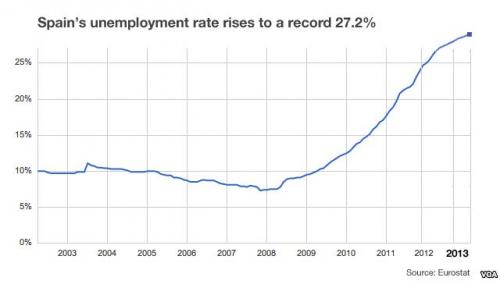Spain's Unemployment Hits Record Numbers
Madrid is bracing for protests later today, as new employment figures show Spanish unemployment shot up to a record 27.2 percent in the first quarter of this year. Joblessness also increased at alarmingly high levels in France, with the number of documented job seekers rising by 1.2 percent in March from February to 3,224,600. That's up 11.5 percent from March of 2012, right before Francois Hollande took over as president in May.

Unemployment in Spain since 2003
More than six million Spaniards now are out of work, underscoring the grim message that the woes of Spain - and number of other eurozone countries - are far from over. Figures published Thursday by Spain's National Statistics Institute also show that nearly one in six Spaniards under the age of 25 is unemployed.
On Friday, Spanish Prime Minister Mariano Rajoy is expected to announce new measures aimed at jump-starting the country's ailing economy.
Standing in line at one Madrid unemployment office, Spaniard Fina Garcia expressed impatience at the government, saying he didn't know what the solution was, but that the government needs to act since the numbers of unemployed people like himself are growing every day. He expressed fear there would be more cuts to come.
Some experts are surprised at Spain's latest unemployment figures. Not analyst Zsolt Darvas, from the Brussels-based economic think-tank Bruegel.
"Unfortunately, I'm not surprised, because the economic outlook of Spain - but also other European countries - is extremely bleak," said Darvas. "There is no private demand, banks are in very bad shape and the policy [is] fiscal conservation. So from these factors nothing else can come out - just some deeper recession or unemployment."
Darvas said he believes the European Union, along with the European Central Bank, should do more to help struggling southern members, as should stronger countries like Germany. He predicts the ECB will be responding shortly by cutting its interest rate.
Growing joblessness also is posing a major problem for neighboring France, the eurozone's second-largest economy. Socialist President Francois Hollande - who came to power last year promising to grow the economy and cut joblessness - is now struggling with record low popularity ratings.
Overall, said Darvas, the outlook for the 17 nations sharing the euro currency is not bright.
"I think the major problem in the euro area is the lack of demand. Because the private consumption is falling, private investment is falling. And at the same time public expenditures are also cut back. So if you put these three things together… nothing else can come out of this, just deeper recession," said Darvas.
One thing that is growing is public anger, with many Europeans taking to the streets to express their discontent with the tough economic times.
Source: Voice of America
- 311 reads
Human Rights
Ringing FOWPAL’s Peace Bell for the World:Nobel Peace Prize Laureates’ Visions and Actions

Protecting the World’s Cultural Diversity for a Sustainable Future

The Peace Bell Resonates at the 27th Eurasian Economic Summit

Declaration of World Day of the Power of Hope Endorsed by People in 158 Nations

Puppet Show I International Friendship Day 2020

